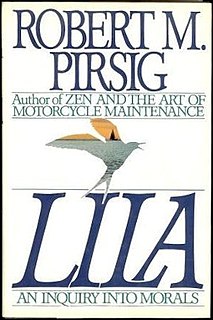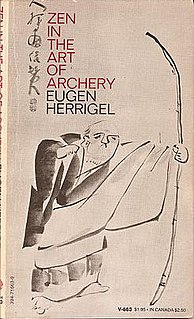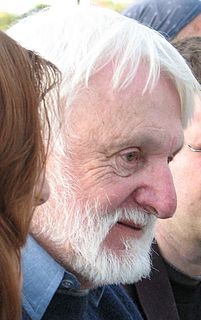
Aesthetics is a branch of philosophy that deals with the nature of art, beauty and taste and with the creation or appreciation of beauty.

Zen and the Art of Motorcycle Maintenance: An Inquiry into Values (ZAMM), by Robert M. Pirsig, is a book that was first published in 1974. It is a work of fictionalized autobiography, and is the first of Pirsig's texts in which he explores his Metaphysics of Quality.

Lila: An Inquiry into Morals (1991) is the second philosophical novel by Robert M. Pirsig, who is best known for Zen and the Art of Motorcycle Maintenance. Lila: An Inquiry into Morals was a nominated finalist for the Pulitzer Prize for Fiction in 1992. This semi-autobiographical story takes place in the autumn as the author sails his boat down the Hudson River. Phaedrus, the author's alter ego, is jarred out of his solitary routine by an encounter with Lila, a straightforward but troubled woman who is nearing a mental breakdown.

The map–territory relation describes the relationship between an object and a representation of that object, as in the relation between a geographical territory and a map of it. Polish-American scientist and philosopher Alfred Korzybski remarked that "the map is not the territory" and that "the word is not the thing", encapsulating his view that an abstraction derived from something, or a reaction to it, is not the thing itself. Korzybski held that many people do confuse maps with territories, that is, confuse models of reality with reality itself. The relationship has also been expressed in other terms, such as Alan Watts's "The menu is not the meal."
The Japanese and Korean term mu or Chinese wu, meaning "not have; without", is a key word in Buddhism, especially Zen traditions.

Arete, in its basic sense, means "excellence of any kind". The term may also mean "moral virtue". In its earliest appearance in Greek, this notion of excellence was ultimately bound up with the notion of the fulfillment of purpose or function: the act of living up to one's full potential.

Zen in the Art of Archery is a book by German philosophy professor Eugen Herrigel, published in 1948, about his experiences studying Kyūdō, a form of Japanese archery, when he lived in Japan in the 1920s. It is credited with introducing Zen to Western audiences in the late 1940s and 1950s.
The Voyager Company was a pioneer in CD-ROM production in the 1980s and early 1990s. The company published The Criterion Collection, a pioneering home video collection of classic and important contemporary films on Laserdisc. It was founded in 1984 by four partners: Jon Turell, Bill Becker, Aleen Stein and Robert Stein in Santa Monica, California, and later moved to New York City. The firm took its name from the Voyager space craft.
Multiple Registration Protocol (MRP), which replaced Generic Attribute Registration Protocol (GARP), is a generic registration framework defined by the IEEE 802.1ak amendment to the IEEE 802.1Q standard. MRP allows bridges, switches or other similar devices to be able to register and de-register attribute values, such as VLAN identifiers and multicast group membership across a large LAN. MRP operates at the Data Link Layer.
Richard McKeon was an American philosopher and longtime professor at the University of Chicago. His ideas formed the basis for the UN's Universal Declaration of Human Rights.

Zen is the Japanese variant of Chan Buddhism, a Mahayana school that strongly emphasizes dhyana, the meditative training of awareness and equanimity. This practice, according to Zen proponents, gives insight into one's true nature, or the emptiness of inherent existence, which opens the way to a liberated way of living.

The Honda CB77, or Super Hawk, was a 305 cc (18.6 cu in) straight-twin motorcycle produced from 1961 until 1967. It is remembered today as Honda's first sport bike. It is a landmark model in Honda's advances in Western motorcycle markets of the 1960s, noted for its speed and power as well as its reliability, and is regarded as one of the bikes that set the standard for modern motorcycles.
A gumption trap is an event or mindset that can cause a person to lose enthusiasm and become discouraged from starting or continuing a project. The word "gumption" denotes a combination of commonsense, shrewdness, and a sense of initiative. Although the last of these traits is the primary victim of the "gumption trap," the first two suffer indirectly in that a reduction in initiative results in a reduction in constructive activity and therefore inhibits one's development of the first two traits. The "trap" portion of the term refers to the positive feedback loop that the event or mindset creates: That the reduction in the person's enthusiasm and initiative decreases both the person's likelihood of success in that project and the degree of success likely. The usual result, whether a mere lack of success or instead an outright failure complete with embarrassment and loss of the resources initially invested, further discourages the person.
In business, engineering, and manufacturing, quality has a pragmatic interpretation as the non-inferiority or superiority of something; it's also defined as being suitable for its intended purpose while satisfying customer expectations. Quality is a perceptual, conditional, and somewhat subjective attribute and may be understood differently by different people. Consumers may focus on the specification quality of a product/service, or how it compares to competitors in the marketplace. Producers might measure the conformance quality, or degree to which the product/service was produced correctly. Support personnel may measure quality in the degree that a product is reliable, maintainable, or sustainable.
Metaphysics is the branch of philosophy that investigates principles of reality transcending those of any particular science. Cosmology and ontology are traditional branches of metaphysics. It is concerned with explaining the fundamental nature of being and the world. Someone who studies metaphysics can be called either a "metaphysician" or a "metaphysicist".
The following outline is provided as an overview of and topical guide to metaphysics:
In Philippine Culture, Loob or Kalooban refers to one's inner self, or, more specifically, to the internal dimension of a person's identity. Its external counterpart is labas - the physical, outward appearance. Loob is a core concept in Filipino Psychology, a field which is unthinkable without both the internal and external dimensions, "loob"/"labas".

















